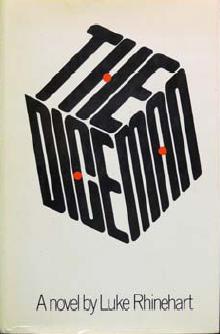Inspiring Older Readers
 posted on 26 Sep 2018
posted on 26 Sep 2018
The Dice Man by Luke Rhinehart
Luke Rhinehart is the pseudonym of George Cockcroft and his 1971 publication, The Dice Man, is almost the definition of a cult novel. When I was working in a Birmingham bookshop in the early 70s I remember selling cartloads of the paperback. Along with books like Zen and the Art of Motorcycle Maintenance and One Flew Over The Cuckoo’s Nest it attracted readers looking for an ‘alternative’ or ‘counter-cultural’ novel that promised a challenge to established social mores.
At the time I never got around to reading it. Actually, that’s not really accurate – that suggests it somehow slipped past me but actually I very deliberately avoided it. I’ve always had that contrarian streak in me that that tends to make me think that anything which attracts lavish, modish praise is probably unlikely to be as good as its acolytes would have us believe.
However, Rhinehart’s book has undeniably attracted florid critical praise and regularly appears in lists of the greatest US novels of the 20th century. Maybe, I thought recently, enough time has now elapsed for me to now get my hands on a copy and see what I’ve been missing.
It was a mistake though: it turns out that this wasn’t the book for me - and here’s why.
Rhinehart writes the book adopting the pretence that this fiction is in fact a biography or memoir:
"A cunning chaos: that is what my autobiography shall be. I shall make my order chronological; an innovation dared these days by few. But my style shall be random, with the wisdom of the Dice. I shall sulk and soar, extol and sneer. I shall shift from first person to third person: I shall use first-person omniscient, a mode of narrative generally reserved for Another. When distortions and digressions occur to me in my life’s history I shall embrace them, for a well-told lie is a gift of the gods. But the realities of the Dice Man’s life are more entertaining than my most inspired fictions: reality will dominate for its entertainment value."
As a married, relatively successful psychiatrist Rhinehart has just one problem – he’s chronically bored with his life. His family life fails to excite him, his job strikes him as pointless and his academic career is mired in ennui. Almost by accident he stumbles on the idea of living his life through decisions made by a roll of a die. Ascribing a series of six options to each decision he could make, he resolves to follow the choice of the die without question.
It’s pretty clear from early on where this will go – traditional social, sexual and personal boundaries will be challenged or blown away as the author in his new persona sets himself free of the conventions that blunt our lives. Along the way there will be shock and humour and the dividing line between what’s taboo and what isn’t will be blurred.
I say it becomes clear that’s the way it will go but in truth that's largely summize on my part. In fact I’ve no idea how it plays out because I didn’t get past the first 100 pages. I found the casual, structural misogyny, violence towards women and perpetual rape fantasies just too much to stomach – and something which now makes the book feel completely out of its time. I’m not someone who favours censorship and I would never seek to stop others reading this stuff. And nor do I think any book that isn’t ‘politically correct’, in the most directive and conservative sense of those words, should be condemned. I’m also not someone who thinks the artists of the past should have the sensibilities of the present but as a social satire this is a book that now feels utterly redundant and unnecessarily offensive – the intervening 40+ years since its publication have not been kind to it.
If you are especially interested in some of the counter-cultural stances of the day, in particular the anti-psychiatry movement, you might still want to get hold of a copy of this book but all I can say is that you should go to it knowing what to expect.
Terry Potter
September 2018